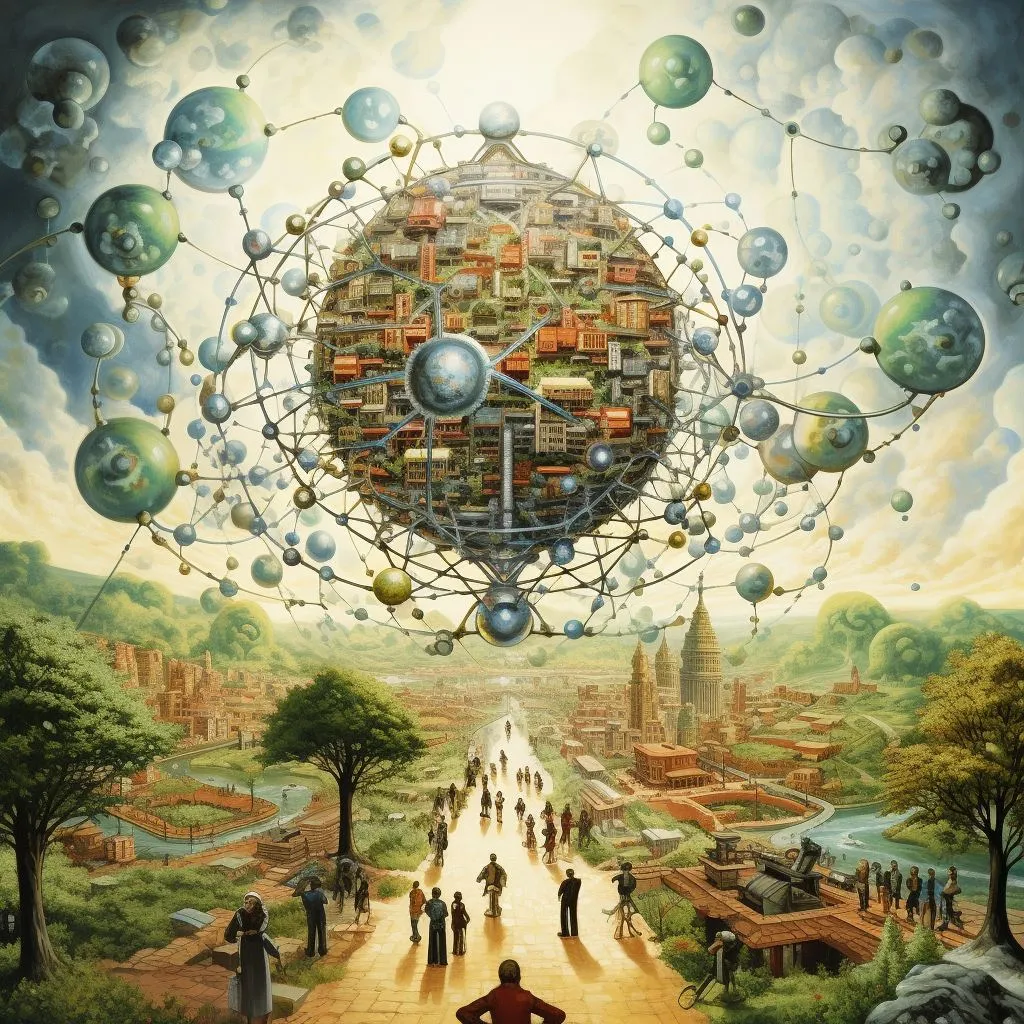
The above image was made by @amberjyang using Midjourney with the prompt 'atoms of people, societal evolution is inherently cooperative in nature.'
In 1902, Piotr Kropotkin published Mutual Aid: A Factor of Evolution. This collection of essays drew from observations of the natural world to argue that cooperation was often more important than competition when determining a creature's environmental fitness. In human societies, systems of mutual aid have always arisen in response to adversity. And authoritarian rulers have always suppressed these mutual aid systems.
The world isn't some grand Hobbesian battle of countless individuals constantly at war with each other. Human society isn't such a battlefield either. Sometimes we fight, but mostly we cooperate. Every part of modern society is a product of this widespread cooperation.
This reality is contested in our minds by dominant cultural stories about the world and our place in it. In practical terms, we're all pitted against each other in the artificial circumstances of the economy. And the corporate entities running the economy are obliged to be as selfish as possible.
In recent years, this state of affairs has produced social atomization on an unthinkable scale. Now we're all in our own digital bubbles, consuming personalized content while our communications are monitored. Globally, the whole direction of technological advancement was turned to provision individuals in the developed world with disposable computerized devices. What this means for us as people isn't at all obvious.
Pop culture functions in part to keep our minds off of thorny questions about our identities. Talking about race and gender is permitted, but only if the conversation conforms to woke norms, which change constantly. Simply asking what it means to be a man or a woman in this brave new world has become hopelessly controversial.
The question of who we are as individuals is assigned far greater importance than the question of who we are in relation to each other. Maybe this is by design. As economic entities, we're contestants in a rigged game. As political entities, we're participants in a corrupt system. If we ever start really talking about who we are in relation to each other, we'll quickly discover that the vast majority of us have interests in common.
I think it's in our common interest to accelerate the evolution of society. While we have the technological means to do this, it's not clear that we have the requisite social resources to even make sense of how that would work. Historically, the evolution of society has always meant increasing complexity. I'm not sure any of us have the bandwidth for more complexity than we're already dealing with.
When everyone got the internet, there wasn't an explosion of mutual aid groups. Today there are some, but not very many. That may mean that our appetite for mutual aid is low. But it may also mean that the right people are unable to find each other and connect in our social ecology.
Read my novels:
- Small Gods of Time Travel is available as a web book on IPFS and as a 41 piece Tezos NFT collection on Objkt.
- The Paradise Anomaly is available in print via Blurb and for Kindle on Amazon.
- Psychic Avalanche is available in print via Blurb and for Kindle on Amazon.
- One Man Embassy is available in print via Blurb and for Kindle on Amazon.
- Flying Saucer Shenanigans is available in print via Blurb and for Kindle on Amazon.
- Rainbow Lullaby is available in print via Blurb and for Kindle on Amazon.
- The Ostermann Method is available in print via Blurb and for Kindle on Amazon.
- Blue Dragon Mississippi is available in print via Blurb and for Kindle on Amazon.
See my NFTs:
- Small Gods of Time Travel is a 41 piece Tezos NFT collection on Objkt that goes with my book by the same name.
- History and the Machine is a 20 piece Tezos NFT collection on Objkt based on my series of oil paintings of interesting people from history.
- Artifacts of Mind Control is a 15 piece Tezos NFT collection on Objkt based on declassified CIA documents from the MKULTRA program.
